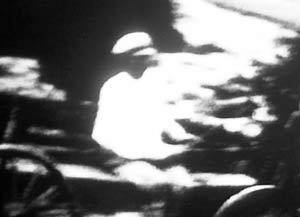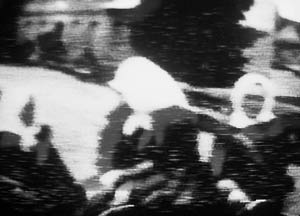

|
More about Gorodok:
Video #2 |
|
 The narrator tells us that this was a poor peasant, most probably barefooted. The kerchiefed women in the wagon below, on the other hand, were much better off, had a nicer wagon, and wore shoes.  |
"Image Before My Eyes," is the name of a 90-minute film about Jewish life in the Pale of Settlement between the two World Wars. The excerpt, of which I found I had the video, includes some, but not all, of the footage from the Horodok silent video, as well as some different footage of what was obviously the same visit, perhaps from another person's handheld movie camera. This excerpt also includes
interviews, segments on other locations and on other topics, including the
wooden synagogues, of which so very few remain. The modern parts are in
color, and the entire 90-minutes is also available through The National Center for
Jewish Film at Brandeis. We see the same fellow herding
the cows back to their
|
![]()
|
The white overlay appears to say, |
![]()
|
|
Market day was a big deal in the lives of shtetl dwellers, most
notably because of its danger. Trouble on Tuesdays and Fridays "Sometimes the Christians [peasants] would get drunk, such as on Tuesday which was market day, on Fridays, and also on holidays," said Dora, Carl Karben's wife. "They didn't like the Jews, and they would make trouble." If there was trouble in the air, "the Karben family would hide in the basement of the house they rented from the blacksmith, and they would lie on the floor with the lights out until the danger had passed."
When Dora had the feeling marauders were about to appear,
she would prepare stacks of latkes or potato pancakes, said Shirley, the
oldest of the three Karben children born in Belarus. Her mother would "stuff
the children's mouths with potato pancakes so we wouldn't make any noise."
|
|
|